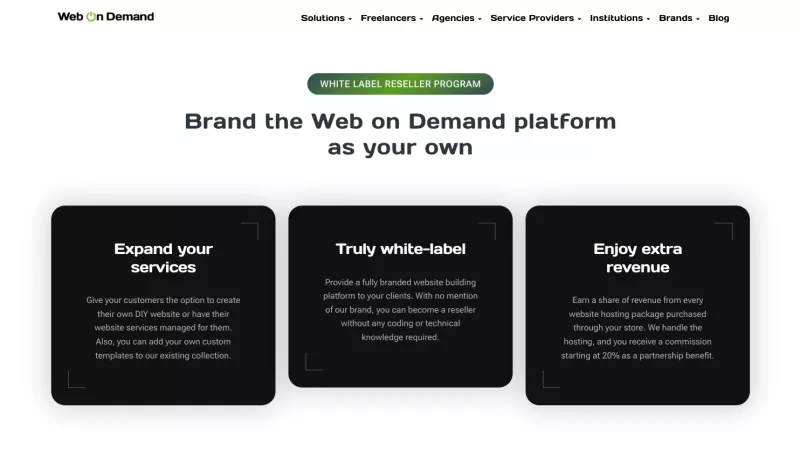In the rapidly evolving world of web design, staying ahead of the competition is crucial for success. As businesses and individuals strive to establish their online presence, the demand for high-quality websites has never been greater. However, not every web design agency or freelancer has the capacity to meet this demand on their own. This is where white label web design comes into play.
White label web design is a collaboration between two parties: a design agency or freelancer who provides the design and development services, and another business or individual who acts as the client-facing entity, taking credit for the work. It is a win-win situation that allows both parties to leverage each other's strengths and grow their businesses. In this blog post, we will explore the concept of white label web design in depth, discussing its historical context, current trends, and potential future implications.
White label services have been around for decades, finding their roots in the manufacturing industry. The term "white label" originally referred to products or services that were produced by one company but sold under another company's brand name. This allowed smaller companies to offer a wider range of products without the need for substantial investments in manufacturing facilities or expertise.
In the web design industry, white label services emerged as a response to the increasing demand for websites. As the internet became more accessible and businesses realized the importance of having an online presence, the supply of web design services struggled to keep up. White label web design became a solution for design agencies and freelancers to scale their operations without compromising on quality or time.
Increased Capacity and Scalability
One of the primary advantages of white label web design is the ability to increase capacity and scalability. By partnering with a white label provider, a design agency or freelancer can take on more projects without the need to hire additional staff or invest in expensive resources. This allows them to meet the growing demand for web design services and expand their business.
Access to Expertise
Collaborating with a white label provider gives web design agencies and freelancers access to a pool of specialized expertise. They can tap into the knowledge and skills of professionals who excel in specific areas such as responsive design, e-commerce integration, or user experience optimization. This ensures that clients receive top-notch websites that align with the latest industry standards and trends.
Time and Cost Savings
White label web design can also be a cost-effective solution for both parties involved. Design agencies and freelancers can save time and money by outsourcing certain aspects of the project to the white label provider, such as coding or content creation. This frees up their resources to focus on other important tasks, such as client management or marketing. On the other hand, the client-facing entity benefits from reduced costs compared to hiring an in-house team, while still receiving high-quality web design services.
Maintain Brand Consistency
For businesses or individuals who act as the client-facing entity, white label web design allows them to maintain brand consistency. They can offer web design services seamlessly under their own brand, ensuring that clients receive a cohesive experience. This strengthens their brand identity and reputation, as they can position themselves as a one-stop-shop for all things related to web design.

To better understand how white label web design works in practice, let's explore a few real-world scenarios where this collaboration model can be applied:
Marketing Agencies
Many marketing agencies offer web design services as part of their overall marketing strategy. However, they may not have the in-house expertise or resources to handle complex web design projects. By partnering with a white label web design provider, these agencies can expand their service offerings without the need to hire additional staff or invest in training. They can focus on their core competency of marketing while relying on the white label provider to deliver beautifully designed and functional websites.
Software Development Companies
Software development companies often have clients who require web design services alongside their custom software solutions. Rather than diverting their development resources to web design, these companies can collaborate with a white label provider to handle the design aspect of the project. This allows them to focus on what they do best - building robust software solutions - while still delivering visually appealing and user-friendly websites to their clients.
Freelancers
Freelancers, especially those who specialize in a specific niche, may encounter projects that require web design skills outside of their expertise. In such cases, partnering with a white label web design provider can be a game-changer. They can leverage the provider's expertise and deliver high-quality websites to their clients, while still maintaining control over the overall project management and client relationship.

1. According to a recent study by
TechNavio, the white label web design market is
expected to grow at a CAGR of 12% between 2021 and 2026, reaching a value of $5.8 billion by the end of the forecast period.
2. A survey conducted by
HubSpot revealed that
78% of marketing agencies prefer to outsource web design services through white label providers to reduce costs and improve efficiency.
3. In a survey of web design freelancers, 62% reported that partnering with white label web design companies has significantly increased their client base and revenue.
4. According to a report by
GoodFirms, businesses that offer white label web design services experience an average
growth rate of 25% per year, indicating the increasing demand for outsourced web design solutions.
5. A study by
Clutch found that 89% of businesses believe that white label web design services
provide better quality and more professional websites compared to in-house design teams, leading to increased customer satisfaction and higher conversion rates

As we look to the future, it is evident that white label web design will continue to play a significant role in the web design industry. Here are some current trends and potential future implications:
Diversification of Services
As the web design industry becomes more competitive, design agencies and freelancers are diversifying their service offerings to stay ahead. White label web design allows them to expand into new areas without taking on unnecessary risks. For example, a design agency that specializes in corporate websites can collaborate with a white label provider to offer e-commerce website development, thereby broadening their client base and revenue streams.
Global Collaboration
With the rise of remote work and the internet's ability to connect people from around the world, white label web design opens up opportunities for global collaboration. Design agencies or freelancers can partner with white label providers located in different countries, leveraging their expertise and cultural insights to deliver websites tailored to specific markets. This global collaboration not only enhances the quality of web design but also promotes cross-cultural exchange and understanding.
Innovation and Specialization
White label web design encourages innovation and specialization within the industry. Design agencies and freelancers can focus on honing their skills in specific areas, knowing that they can rely on white label providers for complementary services. This specialization allows for the development of niche expertise, leading to higher-quality websites and a more diverse range of services available to clients.
Increased Accessibility
As white label web design becomes more prevalent, it has the potential to make professional web design services more accessible to businesses and individuals with limited resources. The cost-effective nature of white label collaborations can help bridge the gap between the demand for quality websites and the affordability of such services. This democratization of web design can empower small businesses, startups, and entrepreneurs to establish their online presence and compete on a level playing field.

White label web design has revolutionized the web design industry, providing a collaborative framework that benefits both design agencies and freelancers, as well as their clients. By leveraging the expertise and resources of white label providers, web design professionals can increase their capacity, access specialized knowledge, save time and costs, and maintain brand consistency. The current trends and future implications of white label web design suggest that it will continue to shape the industry, promoting diversification, global collaboration, innovation, and increased accessibility to professional web design services. Embracing white label web design opens up opportunities for growth and success in the ever-evolving digital landscape. So, whether you are a design agency, a freelancer, or a business in need of web design services, consider the potential of white label collaboration and unlock the full potential of the web design industry

